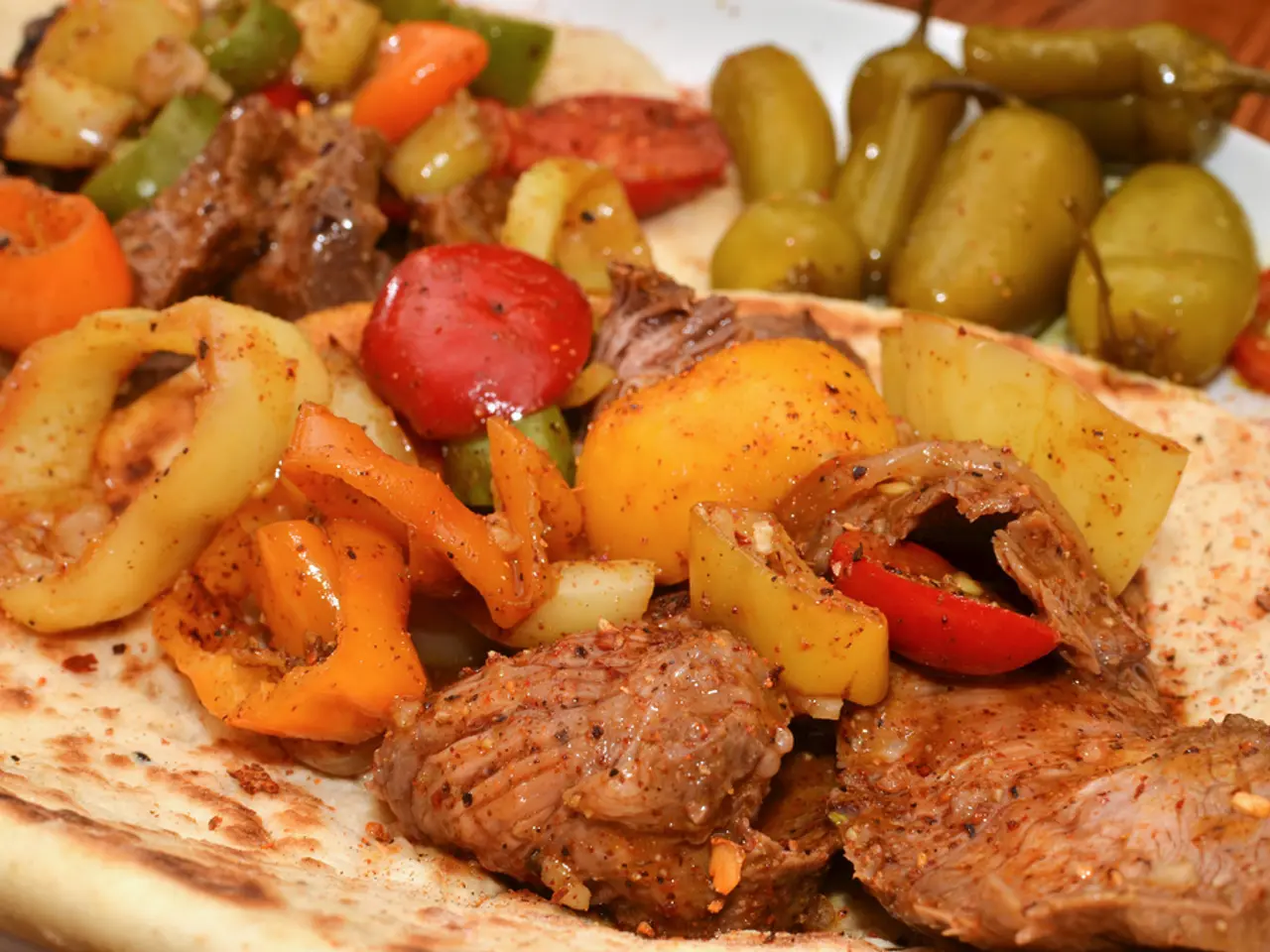Choosing the right foods to consume when ending a fast is significant.
Breaking the Fast: A Guide to Nutritious and Easy-to-Digest Foods
After completing a fast, particularly in diets like the 5:2 diet, it's essential to break the fast with care. Nutrient-dense, easily digestible foods are ideal for easing the digestive system back into activity while providing essential nutrients and reducing digestive discomfort.
A great choice for hydration and easy digestion is bone broth or soups, which are rich in nutrients and easy on the stomach. Cooked vegetables, especially softer options like bell peppers and squash, are also beneficial as they are gentler on the gut than raw vegetables.
Fruits with low sugar and high water content, such as berries and melons, are perfect for satisfying your sweet tooth while keeping your blood sugar levels in check. Lean proteins like fish and eggs offer a good source of protein without adding too much fat or fiber.
Fermented foods, like yogurt or sauerkraut, are beneficial for gut microbiome support, helping to restore the balance of bacteria in your digestive system. Healthy fats like avocados can also be included for their nutritional benefits.
The Mediterranean diet aligns well with these recommendations, as it emphasizes whole, minimally processed foods including plenty of vegetables, fruits (especially berries), fish, nuts, legumes, and healthy fats like olive oil. This diet is nutrient-rich, anti-inflammatory, and gut-friendly, making it an excellent framework to follow after fasting windows in intermittent fasting regimes.
The Mediterranean approach also complements neuroprotective dietary patterns such as the MIND diet, which combines Mediterranean and DASH principles focusing on brain health by prioritizing greens, berries, nuts, whole grains, fish, and lean proteins while limiting red meat and processed foods.
In summary, after fasting, foods that are hydrating, low in fiber and sugar yet rich in protein and healthy fats are best to consume first. The Mediterranean diet naturally supports these principles with its emphasis on diverse, nutrient-dense, and anti-inflammatory foods. Nutrition experts often recommend the Mediterranean diet during periods of low-calorie fasting or regular eating days.
For weight loss, someone may choose to eat less refined carbohydrates when they break their fast, as these can cause rapid spikes in blood sugar levels. Instead, opt for complex carbohydrates like whole grains, legumes, and vegetables, which provide sustained energy and help manage weight.
It's important to note that everyone's body responds differently to fasting, and it's crucial to stay hydrated by drinking sufficient water throughout the fasting period. Additionally, people should consult their doctor before undertaking longer fasts, especially if they have a health condition, take medication, are pregnant, or breastfeeding.
Research suggests that the health benefits of fasting may be due to metabolic switching, where fasting triggers the body to switch its source of energy from glucose to fats and ketones. This process may enhance the body's resistance to oxidative stress and inflammation, potentially offering benefits for weight loss and chronic disease prevention.
[1] Fasting and Dietary Interventions: An Evidence-Based Approach to Weight Loss. (n.d.). Retrieved from https://www.ncbi.nlm.nih.gov/books/NBK499830/ [2] Alternate-Day Fasting: A Review of Human Trials. (2016). Retrieved from https://www.ncbi.nlm.nih.gov/pmc/articles/PMC5011101/ [3] Time-Restricted Feeding and Circadian Rhythms: A Review of the Evidence. (2018). Retrieved from https://www.ncbi.nlm.nih.gov/pmc/articles/PMC6066088/ [4] MIND Diet. (n.d.). Retrieved from https://www.alzheimers.org.uk/about-dementia/risk-factors/lifestyle-risk-factors/mind-diet
- After fasting, such as in the 5:2 diet, it's crucial to break the fast wisely, preferably with nutrient-dense, easily digestible foods to minimize digestive discomfort.
- Bone broth or soups, being rich in nutrients and gentle on the stomach, are an excellent choice for hydration while breaking a fast.
- Cooked vegetables like bell peppers and squash, being softer options, are beneficial as they are less taxing on the digestive system.
- Fruits with low sugar and high water content, such as berries and melons, can satisfy your sweet tooth without causing undesirable spikes in blood sugar levels.
- Lean proteins like fish and eggs provide essential protein without adding excessive fat or fiber, making them a good post-fast choice.
- Fermented foods, such as yogurt or sauerkraut, can aid in restoring the balance of gut bacteria after fasting, boosting overall gut health.
- Healthy fats like avocados can be included for their nutritional benefits, but remember they should be consumed in moderation.
- For weight loss, it's advisable to limit refined carbohydrates and opt for complex carbohydrates like whole grains, legumes, and vegetables during this period, as they provide sustained energy and support weight management.




